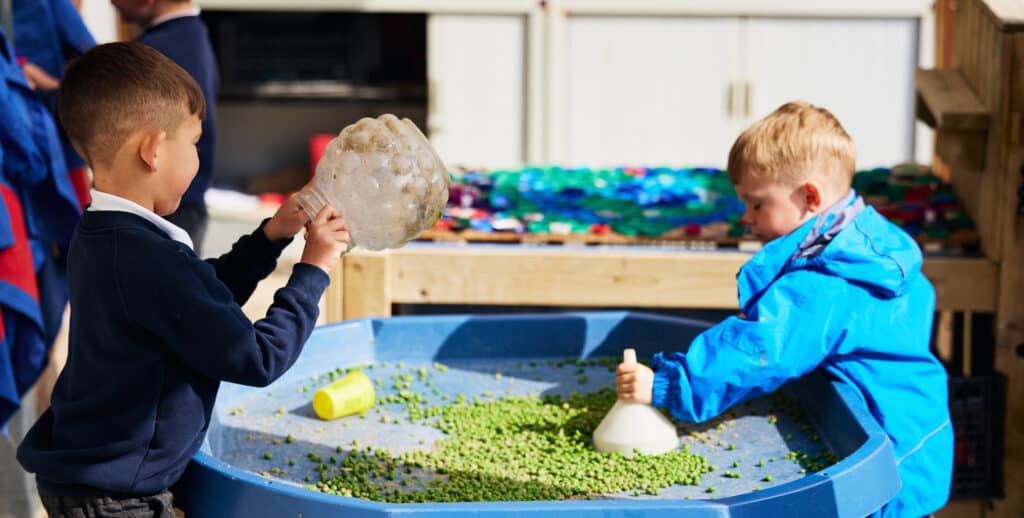10th
in the UK for student satisfaction
Complete University Guide 2023
95%
positivity that the course has developed your knowledge for the future
National Student Survey 2024
Top 10
for learning opportunities
National Student Survey 2024
Join us at one of our Open Days!
Saturday 11 October
Sunday 26 October
Saturday 22 November
Saturday 11 October
Sunday 26 October
Saturday 22 November
Our next Open Day is in:
Overview
Begin your journey towards becoming a skilled Early Years practitioner
Do you know that you want to work with children but haven’t yet decided what area of Early Years to go into?
This degree will give you the chance to experience all areas of Early Childhood Studies to give a better foundation for choosing which career path you wish to take.
National Student Survey 2023
Overall average positivity
Organisation and management
Learning resources
Develop your knowledge and skills
Our BA (Hons) Early Childhood Studies course offers an exciting range of modules, designed to increase your understanding of children and to develop your practice skills and knowledge.
Study areas include:
- Child development
- Children's behaviour
- Safeguarding
- Special educational needs and disability (SEND).
Practical placement options
With a minimum of two practice placements, you will be able to make critical links between theory and practice, building your confidence as an early year’s practitioner.
We believe it is invaluable to link theory that you learn on the degree, with practice. Alongside the placement opportunities on this course, we’ve introduced an optional qualification element to this course to enhance your employability prospects.
Gain your Graduate Practitioner Competencies
In the final year, this course offers you the option to complete a third practice placement in order to gain your Graduate Practitioner Competencies, enhancing employment opportunities within the early year’s sector.
If you follow the Graduate Practitioner pathway in your final year, you will graduate with both a practical and an academic qualification at Level 6. Many of our students also choose to specialise further in a career pathway such as teaching or social work.
Recognised qualification
Our BA (Hons) Early Childhood Studies degree is a recognised qualification by the Department of Education.
This means you will gain a ‘full and relevant’ qualification, which is important should you wish to work in an early years setting and be included in an employer’s staff to child ratio.
Routes for all
We also offer an Integrated Foundation Year option for those looking to develop their academic confidence and skills before beginning a full degree.
In addition, we offer a Level 6 Top-Up option for those who already have a relevant foundation degree and are looking to complete a full BA (Hons) qualification.
On this course you will:
- Investigate, understand and analyse the fast-changing landscape of working with young children.
- Pursue specialisms that allow you to centre your learning around your passions.
- Gain practical experience in different early years settings.
- Provide a firm foundation for a career within educational settings.
The Course
Develop your practice skills and knowledge of working with children
Our diverse and interesting range of modules, taught by our highly experienced and engaging lecturers, ensure that you will graduate with knowledge and skills that are highly sought after.
Modules
Select a year
Child Development
This module introduces the nature of developmental psychology and encourages a critical understanding of psychological theories in relation to children’s development.
You will explore implications for practice within Early Years curriculums and policy, and investigate the relationships between different domains, such as biological, social, emotional and cognitive.
You will be introduced to the idea that development is not fixed at ages and stages, but instead is influenced by social and historical contexts, and explore links between theories of child development and how they underpin and inform practice within the Early Years sector.
Introduction to Academic and Professional Skills
The aim of this module is to develop your understanding of professional and academic skills, including academic writing, reasoning, argument, and critical thinking.
You will be introduced to a range of literature and study various approaches to topics covered within their respective subject areas.
This module will develop digital literacy skills to support professional readiness and will include CV writing and employability skills.
Safeguarding and Integrated Practice
This module aims to develop your knowledge and understanding of the child safeguarding agenda and underpinning legislation.
You will be introduced to current debates around children’s rights, within the current and relevant political frameworks. The complex inter-relationships between protection and rights will also be explored.
You will develop a clear understanding of their duty to safeguard and the reporting responsibilities that accompany this in practice.
Culture, Diversity and Challenging Prejudice
This module aims to develop cultural awareness, promote respect for diversity and develop an understanding of the roots of prejudice. Through discussion and activities, it will encourage you to reflect on personal attitudes and unconscious bias.
In this module, you will consider the impact of cultural heritage, poverty and diversity on education and lived experience and will make clear links to sustainable development goals.
Introduction to Health and Wellbeing
This module aims to introduce you to the concept of health and wellbeing, as well as the various factors that influence a child’s health. You will explore different perspectives on the definitions of health and wellbeing, gaining a deeper understanding of the holistic aspects of health.
There will be a focus on children’s developmental understanding of health and wellbeing, alongside an examination of the impact of both short-term illnesses and long-term conditions.
The module will also examine the overall health of children within the nation, identifying key areas of concern. You will explore health inequalities and the factors contributing to the decline or improvements in children’s health. Both the short-term and long-term consequences of children not achieving optimal health and wellbeing will be discussed.
You will be introduced to the roles of the multidisciplinary teams in the health and education sectors, focusing on how they support children’s health and wellbeing. Additionally, you will explore the connection between these practices and the health frameworks in both sectors, along with their alignment to government policies and initiatives.
By the end of the module, you will have developed a solid foundation of knowledge to support children’s health and wellbeing across education, social care, and health settings.
Children’s Play and Creativity
This module will explore the role of play and creativity in child development. This will include definitions and characteristics of play as well as different types of play.
You will examine the theoretical perspectives and research that underpins the study of play in childhood. There will be guidance and encouragement to foster an awareness of how cultural, social, and historical contexts shape the nature and value of play and creativity.
Areas explored in the module will include the influence of technology on traditional play and the role of play in education, including the impact of play-based learning on academic achievement. You will discuss barriers to play, the impact of overscheduling, and the decline of play in modern society.
Children’s Health & Wellbeing
The module develops your knowledge and understanding of the issues that surround health and wellbeing as they affect children and young people into adulthood.
You will explore how 21st century living has highlighted an increasing concern over the health and wellbeing of children and adults alike, and how this is reflected in current government agendas.
Preparation for Independent Project
You will explore how to conduct empirical research for your Independent Project, and promote understanding of research within the field of Early Years.
In addition, you will develop your awareness of ‘research mindedness’, as well as qualitative, quantitative and mixed research approaches as you link evidence-based research to professional practice.
Rocking the Cradle
This module explores how ethical discussion and legislation have both struggled to keep up with the fast-changing landscape of conception, pregnancy, the birth process and the care of babies up to the age of two years.
These developments have in turn fed into the sociological changes around the nature of parenting, the family and professional practice.
The nature of attachment is shaped by the experience of pregnancy and the birth process. The first two years of the child’s life are important to various key child development theorists and the module will consider the links between theory and practice in relation to Early Years.
Special Educational Needs and Disability
This module develops your critical understanding of the issues that surround special educational needs and disability (SEND) in society and Early Years settings, with reference to government policy initiatives and legislation.
The history, economic and social dimensions of issues relating to special educational needs and disability will be explored, along with an analysis of the impact upon children, families and working practices.
In addition, the origins and meanings of related terminology will be explored and debated.
The Reflective Practitioner
This module enables you to gain assessed experience in a setting which is relevant to Early Years practice.
This will help you form a critical understanding of the ways in which theory and practice relate to one another within an Early Years setting, as well as to develop appropriate skills and gain experience.
Understanding Children’s Behaviour
This work-based learning module will enable you to develop knowledge and critical understanding of the differing theoretical perspectives on children’s behaviour in the early years. Factors relating to children’s specific needs, family, early years settings, wider society and culture will be critically analysed including concepts and principles of inclusion. You will have the opportunity to explore theories, significant and emerging, relating to the psychology of children’s behaviour.
Working With Families
This module will enable you to explore the reciprocal relationships that need to exist between the early years setting, the child and their family. It will encourage you to develop a detailed understanding of the importance of partnership working for the child and their family to promote inclusion and collaboration.
Children, Stories and the Media
This module uses children’s stories and the media to explore current and past constructs of childhood. Specific examples of these media are used to consider the wider social, cultural and educational issues that surround their production and consumption.
In this module, you will critically examine studies of how children engage with a range of different media that is produced for children.
This includes:
- books (both fiction and non-fiction)
- television
- film
- the ‘new media’ that is available for children, including other interactive media such as computer games.
You will also consider the ways in which those who study childhood have sought to understand this engagement. The module will take a broad approach, drawing on theories from a range of social science and cultural disciplines.
Crime and Childhood
This module explores children and criminality from various points of view, from offending to court procedures, from explanations of children’s crime to protection of victims, and allows you to draw conclusions about the special status of children and the legal system.
You will examine the ‘social construction of childhood’ both historically and internationally in regard to how children are treated in the criminal justice system.
Case studies will be used to illustrate how criminal law and childhood is given particular significance, including use of media coverage.
Issues around children and crime are of contemporary relevance, and this module will provide insights into the many avenues of childcare practice that are connected to the criminal justice system.
Graduate Practitioner Placement
This practical placement module builds on theory from taught modules in the programme and placements at both Levels 4 and 5. It gives you opportunities in relevant settings to achieve the Early Childhood Graduate Practitioner Competences. You will complete 25 days in a placement setting and workshop sessions in the university.
Independent Project
The independent project is designed to engage you in a longer-term and analytical piece of research on a topic relevant to Early Childhood Studies. The module includes a focus on the research process. This includes guidance on research design, writing a literature review, application of methodological approach and method(s) used, ethical issues, data collection and analysis.
Adventure Education
This module introduces you to the innovative and adventurous environments in which children can develop, learn and play such as Forest Schools and Beach School.
You will examine the theoretical, psychological, physical and social processes and benefits for children and Early Years professionals/teachers that come with activities away from conventional environments.
The module considers the history and theory that has shaped ‘adventure’ environments in the past, and continue to affect them in the present.
Leading Professional Practice
This module aims to introduce you to the key factors that affect strategies for leading and managing in Early Years provision. You will develop knowledge and understanding of how to improve practice through working alongside staff, children, families and other professionals.
The Digital Child
The module introduces you to the digital experiences of childhood, and the effects of technology on children in a fast-changing world, as you assess the benefits and drawbacks from social, emotional and behavioural perspectives.
The module examines access to the online world, and policy and parental attempts to control children’s digital consumption.
Therapeutic Play
This module aims to explore and critically analyse the centrality of play in enabling children to make sense of the world around them and their place within that world, especially when experiencing trauma.
Teaching and Assessment
Feel the support of our staff as you gain confidence in your abilities
Teaching
You will learn from expert practitioners and accomplished academics with a wide range of experience within the field of Early Childhood Studies.
We bring new research together with established theory into the classroom through a mix of direct teaching, seminars and activity-based learning.
Within your learning sessions, you will be challenged to go further and be encouraged to be proactive, responsive and responsible for your own learning and ideas outside of the classroom.
Our focus on group discussion and the consideration of the thoughts of others allow you to develop your own ideas.
Assessment
It is important that our assessments are designed to meet the various learning needs of students.
We offer a variety of assessment methods that include presentations, assignments, exams, academic posters and placement portfolios.
We also encourage our students to publish their work. Past students have had articles accepted in sector publications such as Early Years Educator.
Experience
Discover facilities and staff that help support your learning
Close community
Our commitment to a friendly and close-knit student community contributes to a high degree of success for our graduates.
Learning Resource Centre
The Learning Resource Centre (LRC) contains the library, a café, IT/teaching rooms and the Support and Information Zone (SIZ).
Library
Our campus library holds more than 200,000 books and over 500,000 eBooks.
Expert staff
Learn from expert and experienced teaching staff who are here to support your needs.
Subject specific librarians
If you have difficulty finding material for an essay, seminar or project, subject librarians will be happy to provide assistance.
Family Festival 2024
The Childhood and Social Work department organised the inaugural Family Festival in response to student feedback. There were many free activities for students and their families to participate in and the day was a huge success. There is something special about the way we listen to our students and then turn this into practical action and support.
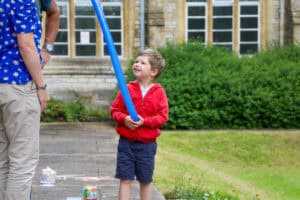
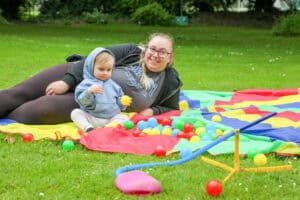
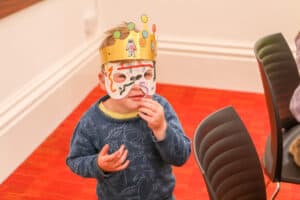
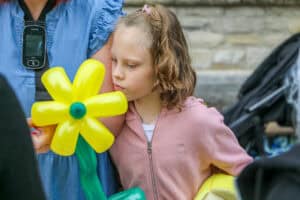
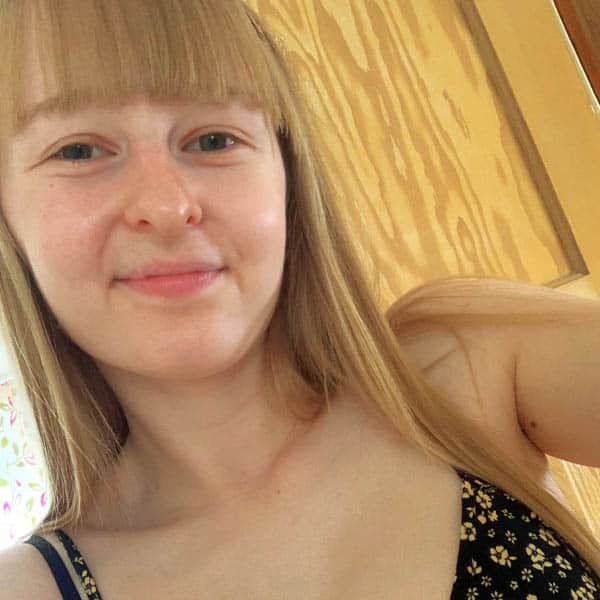
Amy
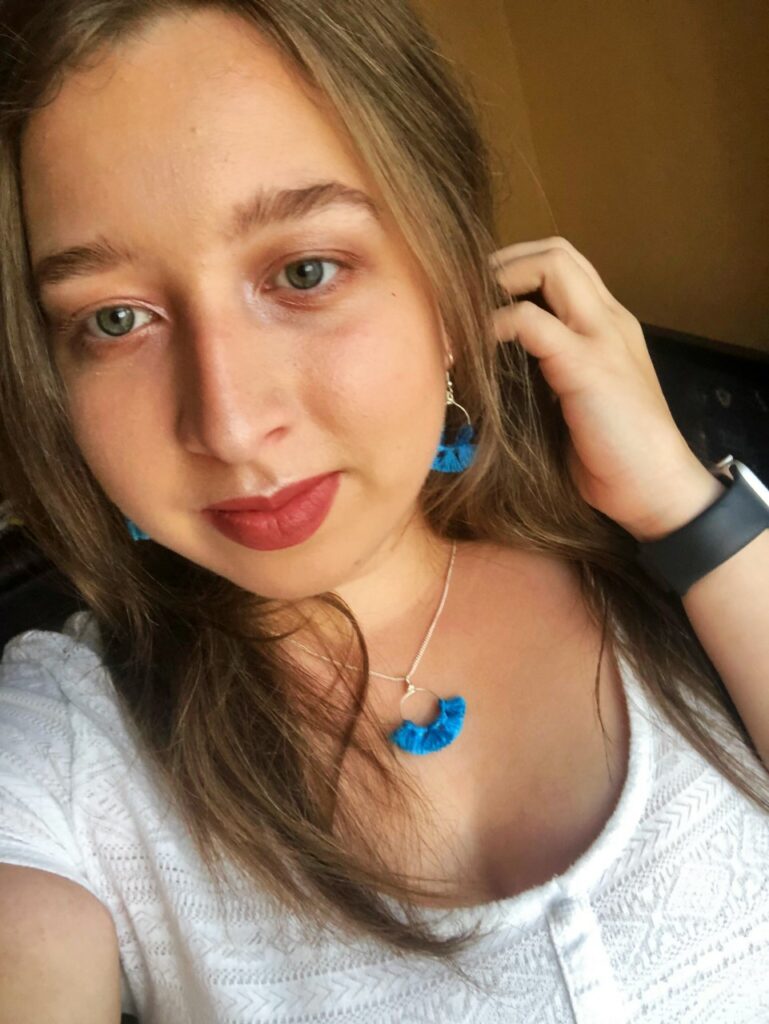
Kat
Work Placements
Gain vital experience within a professional environment to support your learning
As part of our BA (Hons) Early Childhood Studies, you will gain the opportunity to experience placements during both your second and third years.
These placements will allow you to work directly within local early years settings as you apply your theoretical learning within a real-world classroom environment.
Placements are assessed, which means you will exit the course with the equivalent of the Department for Education (DfE) full and relevant requirements for Early Years practice.
We have incorporated the option of the Graduate Practitioner Competencies into your placements, which allows you to finish the course as a Graduate Practitioner.
On this course, you could gain a total of 80 days of work-based placements. You’ll get the chance to attend three different registered organisational settings to gain a mix of experience. You’ll also gain the opportunity to work with babies, 3-5 and 5-7 year olds.
The placements gained in Years 1 and 2 (Level 4 and 5) will be counted as ‘full and relevant’ which means with this degree, you will be counted at Level 3 in staff-child ratios.
- Year One – 25 days
- Year Two – 30 days
- Year Three –25 days – Graduate Practitioner Competencies (optional placement).
If you choose to take our dedicated third-year placement module, you will receive a separate certificate stating that you have been awarded the Early Childhood Graduate Practitioner Competencies.
International Exchange
See our opportunities for incoming and outgoing international study
Whether you are considering studying here and want to take either a semester or year out to study abroad, or if you are currently studying at a University which has a partnership with the University of Chichester – engaging in an international exchange study programme enriches and broadens your educational experiences.
Outgoing students
As a student at the University of Chichester, you will have the opportunity to study at one of our partner institutions in your second year of study.
Students have found it to be an amazing experience to broaden their horizons, a great opportunity to meet new people, undertake further travelling and to immerse themselves within a new culture.
See our Outgoing Exchanges page for more information.
Incoming students
Coming to study at the University of Chichester, you will be welcomed into our community and discover a new culture. The city of Chichester is a beautiful and historic place for you to get to know.
You are also close to the lively cities of Brighton, Portsmouth and Southampton as well as a train journey away from London.
Integrated Foundation Year Option
Build your academic knowledge, skills and confidence before your studies begin
Are you interested in studying for an early years degree but feel you would benefit from a better foundation of knowledge? Then the BA (Hons) Early Childhood Studies with Integrated Foundation Year is an ideal option for you.
This four-year route will build your academic skills and enable you to confidently embark on an undergraduate degree, as you focus on work with young children up to the age of eight after building a strong foundation of academic knowledge.
Studying at university can be challenging, so this course includes an introductory year to build your academic knowledge, skills and confidence.
Foundation Year
- Foundation in Knowledge and Skills
- Learning Outdoors
- Academic Support and Guidance
- Professional Studies: Learners and Learning
- Valuing Individual Differences
- Education, Philosophy and Thinking: Historical Perspectives
- From Bognor to Bogota and Beyond: An Introduction to the UN and SDGs
- Arts in Education and Society.
Year One:
- Child Development (0-8)
- Preparing for Professional Practice
- Safeguarding Children and Integrated Practice
- Children’s Rights and Policy
- Play, Creativity and Expressive Arts
- The Developing Practitioner (Placement).
Year Two
- Children’s Health and Well-Being
- Rocking The Cradle
- Curricula Around The World
- Childhood in Crisis: Global Perspectives
- Special Educational Needs and Disability
- Preparation for Independent Project
- Working with Families
- Understanding Behaviour
- The Reflective Practitioner (Placement).
Year Three
- Independent Project
- Children’s Literature and the Media
- Criminology and Childhood
- Learning, Teaching and Caring in Adventure Education
- Reflective Practice Placement 2
- Special Needs and Disability.
This list is indicative and subject to future change.
This course offers
- An additional year to build academic skills.
- Lower entry requirements than the main degree pathway.
- More insight into education degree pathways and careers.
- Includes a school placement to give you a taster of a career in teaching.
Learn more about our BA (Hons) Early Childhood Studies with Integrated Foundation Year option.
Course costs and entry requirements
- 2022/23 UK fee: £9,250
- 2022/23 International fee: £14,500
- A minimum of 48 UCAS tariff points or equivalent.
- Enhanced DBS check required
- If English is not your first language: IELTS 6.0 overall with a minimum of 5.5 in writing or equivalent
- Non-standard Application Entry Routes: The University has an alternative entry route for applicants who have relevant skills and experience but who do not hold the formal minimum entry qualifications required. Applicants who demonstrate the necessary skills and experience to enter a course of higher education will be asked to complete an entry task involving the completion of specially set assignments.
Level 6 Top-Up Option
Gain your full BA Honours degree with this flexible and accommodating top-up course
The BA (Hons) Early Childhood (Level 6 Top-Up) is a one-year full-time or two-year part-time course. It is delivered one day a week making sure it’s flexible to accommodate your other commitments.
The range of modules enables you to explore key aspects of childhood from the psychological and sociological, to the global and cultural, to the economic and educational.
You will develop problem-solving, critical analysis and independent thinking skills as well as gaining knowledge of areas which are of particular interest.
This course provides a progression for those who wish to ‘top up’ their Early Years Foundation Degree or equivalent foundation qualification to a full BA Honours degree.
Indicative module list:
- Independent Project (Dissertation)
- Therapeutic Play
- Children’s Literature and the Media
- Criminology & Childhood
- Learning, Teaching & Caring in Adventure Education
- Reflective Practice Placements 2
- Special Needs & Disability
- Graduate Practitioner Option.
Why study this course?
- The degree equips you to explore a range of careers in the early years sector.
- It is a recognised qualification by the Department for Education.
- It also offers pathways into a variety of careers. We offer postgraduate qualifications, in order to work within the fields of health, education and social work.
- You’ll learn from a dedicated and highly-skilled team.
Learn more about our BA (Hons) Early Childhood Studies Level 6 Top-Up option here.
Course costs and entry requirements
- 2022/23 UK fee: £9,250
- 2022/23 International fee: £14,500
- 240 credits (120 credits at Level 4 and 120 credits at Level 5) in a related subject, such as, Early Childhood.
- Relevant Foundation Degree in Early Years or Teaching and Learning Support.
- International equivalent 240 credits (120 credits at Level 4 and 120 credits at Level 5).
- Professional experience of working and/or volunteering in an early years setting, such as, nursery, day care, childminding, school (Year R or Key Stage 1), children’s centre or other.
Careers
Develop your career opportunities within early years professions
With this degree, you can pursue a career as an Early Years Practitioner.
You’ll foster and develop the abilities, social skills and understanding of children aged three to five, focusing on optimum child development and preparation for a successful transition to primary school education.
Possible career paths include:
- Early Years management
- Teaching
- Health and social care
- Policy-making
- Nursery management
- Hospital support
- Outreach worker with family centres
- Community development.
University of Chichester alumni who have completed a full undergraduate degree at the University will receive a 15% discount on their postgraduate fees.
Course Costs
Course Fees 2025/26
UK fee
International fee
EU/EEA Fee Reduction Scholarship
EU/EEA students automatically pay the equivalent of UK fees via the EU/EEA Fee Reduction Scholarship
For further details about fees, please see our Tuition Fees page.
For further details about international scholarships, please see our Scholarships page.
To find out about any additional costs on this course, please see our Additional Costs page.
Course specific costs
You will be required to have a satisfactory enhanced Disclosure Barring Service (DBS) check costing £40 which needs to be paid for before the start of the course.
Entry Requirements
Applying through Clearing
We know that you are so much more than your grades, which is why in Clearing we take your aspirations, passion and personality into account. Contact us to explore your options and learn more about how we can help you succeed.
UCAS
A Levels
T Level
BTEC
Cambridge Technical
CACHE Level 3 Diploma
Access to HE Diploma
IB
GCSE English Language
Contextual offers
We believe everyone deserves an equal opportunity to pursue higher education, regardless of their background.
When we receive your application we consider your personal circumstances and the factors surrounding your achievements to see if you are eligible for a contextual offer. This is an offer with a reduced entry tariff – typically the equivalent of 16 fewer UCAS points (two A-level grades).
Find out more about our contextual offers.
DBS
BA (Hons) Early Childhood Studies applicants are required to have an enhanced Disclosure Barring Service check which needs to be paid for before the start of the course.
We strongly suggest that all students sign up for the Disclosure and Barring Service update service for which there is a small annual charge, this makes the DBS portable both during and after the degree.
Failure to sign up for the update service might require the student to gain a further enhanced Disclosure and Barring Service check which will incur additional costs.
